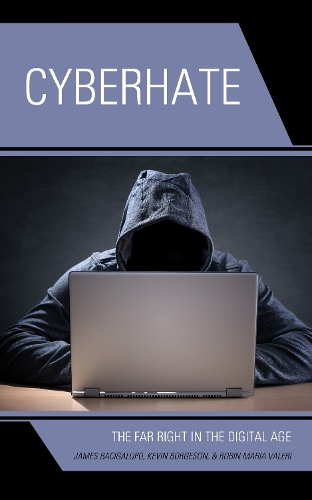
Cyberhate: The Far Right in the Digital Age
(Hardback)
Publishing Details
Cyberhate: The Far Right in the Digital Age
By (Author) James Bacigalupo
Edited by Kevin Borgeson
Edited by Robin Maria Valeri
Contributions by James Bacigalupo
Contributions by John Bambenek
Contributions by Kevin Borgeson
Contributions by Janine Fodor
Contributions by Samantha Hausserman
Contributions by Michael Hoffman
Contributions by Michael Loadenthal
Bloomsbury Publishing PLC
Lexington Books
14th January 2022
United States
Classifications
Professional and Scholarly
Non Fiction
Social discrimination and social justice
Ethnic groups and multicultural studies
Violence and abuse in society
345.025
Physical Properties
Hardback
186
Width 160mm, Height 228mm, Spine 18mm
413g
Description
Cyberhate: The Far-Right in the Digital Age explores how right-wing extremists operate in cyberspace by examining their propaganda, funding, subcultures, movements, and ideologies, as well as the legal and cultural responses offline far-right violence. Scholars and practitioners from a wide range of disciplines provide extensive analysis of how the far-right operates on the internet and why this particular type of hate often progresses to extreme violence. Specific topics include far-right propaganda, bitcoin funding, online subcultures such as the manosphere, theories that explain why some take the path of violence, and specific movements including the alt-right and the terroristic Atomwaffen Division. Relying on manifestos and other correspondence posted online by recent perpetrators of mass murder, this book focuses on specific groups, individuals, and acts of violence to explain how concepts like white genocide and incel ideology have motivated recent deadly violence. This book would be of interest to anyone studying criminal justice, criminology, psychology, cybersecurity, religion, law, education, or terrorism studies.
Reviews
This is an important book at just the right time. We are seeing an increase in hate crimes nationally and an increase in the role the internet is playing in encouraging bias motivated violence. The authors have described in a clear but detailed way the techniques internet sites and social media platforms use attract and retain visitors as well as the ways organized hate groups have used cryptocurrency to fund their organizations. This is a very important book for police, prosecutors and policy makers who are on the front lines fighting against hate and violence.
--Jack McDevitt, Northeastern UniversityAuthor Bio
James Bacigalupo is a doctoral student in the criminology and justice studies program at the
University of Massachusetts, Lowell.
Kevin Borgeson is associate professor of criminal justice at Salem State University and former
Research Fellow for The Center for Holocaust and Genocidal Studies.
Robin Maria Valeri is professor of psychology and Director of the Center for Nonviolence at St. Bonaventure University.
